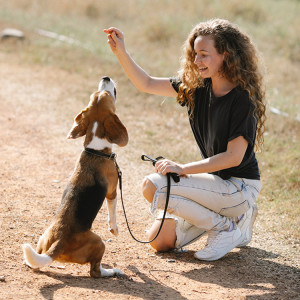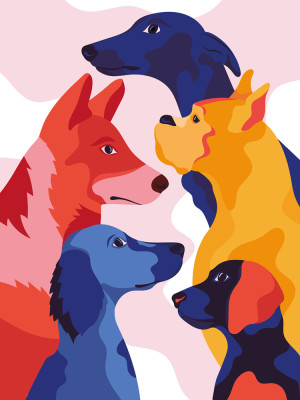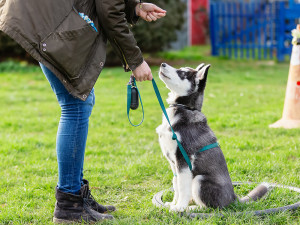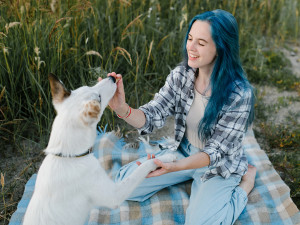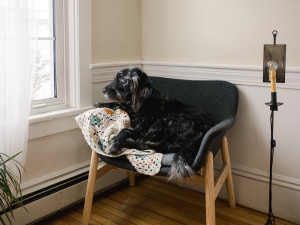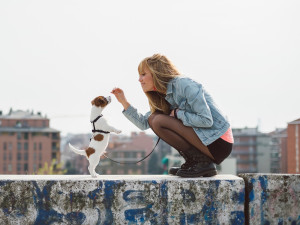Hold the Judgment: Change the Way You Think About Your Dog’s Behavior
Instead of focusing on the negatives, here’s what you should do instead.
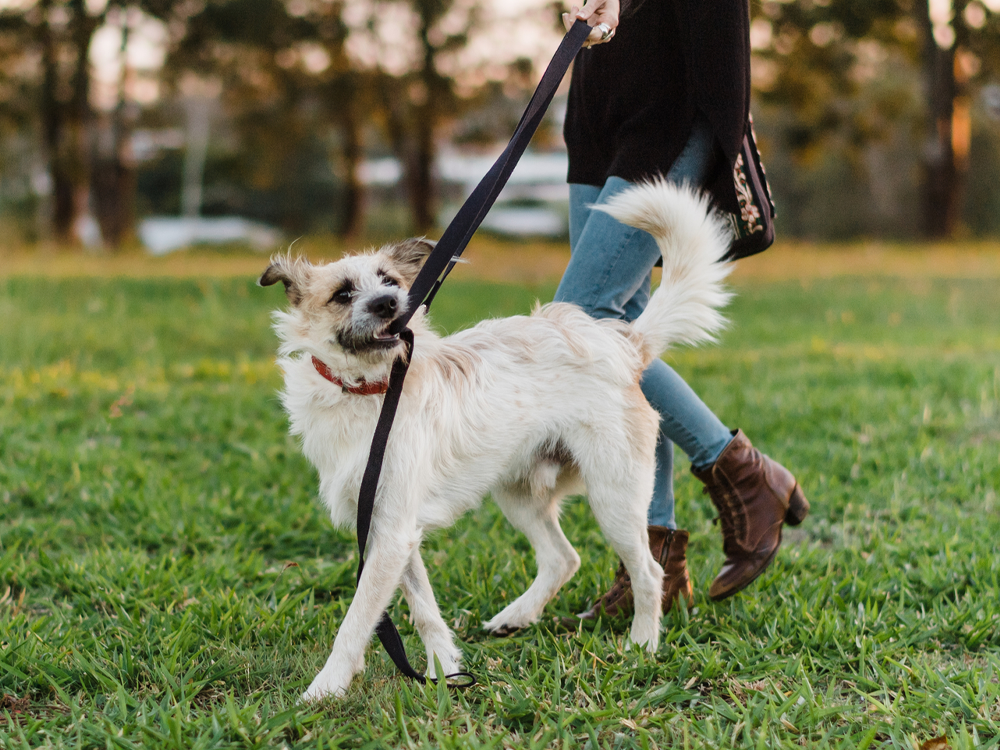
share article

Your pet wants you to read our newsletter. (Then give them a treat.)
Having a dog can be one of the best things in the world, but it can also be scary and downright frustrating at times. As parents, we all have a vision in mind of what we want our dogs to be like. We want them to listen, be well-behaved, and to exhibit the traits that we associate with a well-trained dog. But many dog parents struggle to get these goals conquered and often find themselves being frustrated with their dog’s behaviors, especially if these naughty behaviors take place in public. If this resonates with you, don’t worry. I see this a lot, you’re not alone, and it’s nothing to be ashamed of.
The problem is that we often approach our dogs’ behaviors from the wrong perspective. Instead of focusing on what we want our dogs to do, we focus on what we don’t want them to do. This is especially true when it comes to negative behaviors, such as jumping on peopleopens in a new tab, pulling on the leashopens in a new tab, barkingopens in a new tab, or diggingopens in a new tab. Many try to stop their dogs’ choices by scolding them.
But this approach is both ineffective and damaging. Punishing your dog for a behavior that you don’t like will only create fear and anxiety and will not address the underlying cause of the behavior — which could be fearopens in a new tab, anxietyopens in a new tab, or confusion over what you’re asking them to do. In fact, by doing this, you can even make the behavior worse; your dog may start to associate the punishment with you, rather than with the behavior itself.
Change the Way You’re Thinking
For us to succeed with training, we often need to reframe the way we think about our dogs’ behaviors. Instead of focusing on the negatives, we need to focus on the positives and the goal. We need to think about what we want our dogs to do and how we can reinforce that behavior. To repeat that one more time, reward the desired behavior you want and replace that behavior with the behavior you don’t want.
To do this, we need to understand our dogs’ motivations and behavior patterns. Often if we can identify what triggers the negative behavior, we can find a way to redirect that energy into a positive behavior. For example, if your dog barks when they see another dog, you can train them to sit and stay quiet at a distance as soon as they see the dog but before they start to bark. You can then reward them with treatsopens in a new tab, praise, and attention for exhibiting the desired behavior of sitting and staying quiet. Remember, it’s important you start this before the action of barking occurs.
A big part of this is mental; once you master that, it will start to click and also change your frustration, which will help grow your bond. So, instead of getting mad or frustrated with your dog, think about what you would rather your dog be doing. Let’s go over a few examples:
Original: My dog needs to stop jumping on friends who come over.
New thinking: My dog should sit at the front door when people come over to be greeted.
Original: I’m upset that my dog keeps grabbing food off the countersopens in a new tab when I’m cooking.
New thinking: My dog needs to stay on the mat in the kitchen when I’m in there.
Remember, Your Dog Is a Toddler
This might take a moment at first, and that’s OK. Another important aspect of reframing our mindsets as pet parents is to understand that setbacks and frustrations are a completely normal part of the training process. Training a dog is not a one-time event, but a continuous process of learning and growth together. Just like with any other skill, it takes time and patience for these new behaviors to become routine to our pet, but the more we reward the desired behaviors, the behaviors we don’t want to occur will happen less and less.
Don’t forget: You’re pretty much dealing with a toddler. Although our dogs may be exceptionally talented in performing tricks or completing agility courses, their mental capacity is roughly equivalent to that of a two-to-five-year-old child. While we may value our dogs for their reliability, medical alertness, and communication abilities through buttons, we must keep in mind that their cognitive abilities are very similar to that of young kids. Therefore, we must make sure to set them up for success in various situations as we would a toddler.
Would you let a three-year-old wander around a dinner party and expect that child to behave themselves? No, you wouldn’t. So, at that same dinner party you’d need to give your dog the skills to succeed, too. Maybe that’s being on leashopens in a new tab when first meeting all the arriving guests or being tethered with a stuffed Kongopens in a new tab on a dog bedopens in a new tab right near me so they stay a bit occupied.
Would you leave a toddler in the kitchen with a big chocolate cake within reach? Of course not. You also wouldn’t leave meat and tasty items that a dog finds valuable on the counter within reach of their paws or mouth. Instead, you are there to monitor your dog and reward them for staying in their designated “place.”
Reframing our mindset as dog parents is key to successful training. By focusing on the positives, understanding our dogs’ motivations and behavior patterns, and being patient with the process, we can create a deeper connection and relationship with our pups.
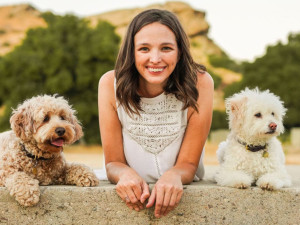
Nicole Ellis, CPDT-KA
After a childhood of horse-riding and pet obsession, Nicole Ellis studied with top animal trainers working with everything from exotic animals, such as bears and big cats, to household pets. During her studies, she realized her true mission was training other humans in strengthening their human-pet bonds. Alongside her rescue Bichon / Poodle mix, Maggie, she uses positive reinforcement training to teach pets new skills and healthy behaviors. Ellis stars as a celebrity dog trainer on The Pack (Amazon Prime) and travels to hospitals and nonprofit orgs with Maggie to educate. Maggie was also was the inspiration behind Ellis’s book, Working Like a Dogopens in a new tab.
Related articles
![Boston terrier being stubborn]() opens in a new tab
opens in a new tabDog Training — DIY or Hire a Pro?
When it’s time to call in reinforcements.
![Woman trains with a young husky on a dog training field]() opens in a new tab
opens in a new tabPro Tips: How to Find a Qualified Dog Trainer
The questions to ask and credentials to look out for to find the right trainer for your dog, according to a pro.
![girl with blue hair starting puppy training with white dog]() opens in a new tab
opens in a new tabPuppy Training 101: How to Train a Puppy
You gotta start somewhere.
![A dog sitting in a chair staring out a window.]() opens in a new tab
opens in a new tabCeleb Dog Trainer Nicole Ellis on Getting Your Dog Used to Your Office Return
It’s 2023, and the office is calling. How can our dogs cope?
![A woman in a black coat squatting down to speak to her Dalmatian dog who is looking away from her to the camera on a dirt path next to a pond on with fall leaves around]() opens in a new tab
opens in a new tabHey, Why Is Your Dog Ignoring You?
Six tips and tricks to get your dog to listen to you.
![Young blonde woman with a Jack Russell puppy during spring in the city.]() opens in a new tab
opens in a new tabThe Best Training Treats for Dogs in 2024
The most mouth-watering treats for training your pup.

